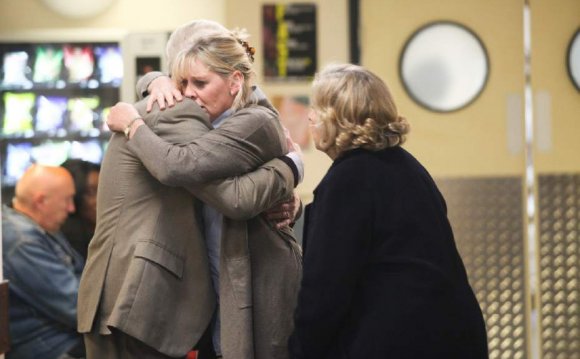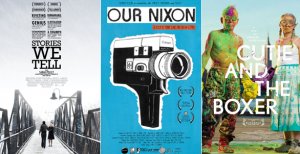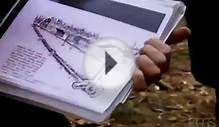
 By Marianna Torgovnick
By Marianna Torgovnick
Some documentaries show us the strange, the exotic and the unfamiliar; others make us feel anew about something so everyday, we barely thought about it before. Some of my favorite TED Talks are built around great documentary films, like Deborah Scranton’s chilling “War Tapes” and Nathaniel Kahn’s moving search for “My Father, the Architect.”
Below, find my nine favorite films from the festival, which no documentary fan should miss.
1. Stories We Tell (director Sarah Polley, 2012)
An invited film that has shown at festivals in Toronto and New York, Sarah Polley’s gorgeous documentary is structured liked a mystery in which trap doors keep opening. Once an actress, the still-young Polley has directed two feature films: Away from Her, and the enigmatic Take this Waltz. Stories We Tell literally turns the camera on Polley, her family and her friends in a quest to find the truth about her mother, who died of cancer when Polley was eleven. The youngest child in her family, Polley’s questions interrogate the meaning of love, marriage, parenting, fidelity, the meaning of fatherhood, and the possibility of creative chaos. If that sounds like a lot, it is. But this beautiful and cunningly structured film is not just wonderfully crafted — it is also haunting and evocative as Polley’s family history becomes a metaphor for, well, the stories we tell and what we mean when we tell them. Part documentary, part fictional recreation of the past, this film is 100% worth seeing.
2. Muscle Shoals (director Greg “Freddy Camalier, 2012)
A new documentary that has the impact of a musical freight train, Muscle Shoals chronicles the men and stars behind Fame Recording Studios in the small Alabama town called Muscle Shoals. Narrated by Bono (watch his talk, “The good news on poverty”), Keith Richards, Percy Sledge, Aretha Franklin, Alicia Keys and others, the film features interviews with founder Rick Hall and his surprising back-up band, The Swampers, a group of local white teenagers. They looked, as the film says, like they worked at Walmart, but found within themselves the miraculous ability to endow singers like Franklin – not to mention bands from the Stones to Traffic — with a missing ingredient called soul. The Swampers eventually become Hall’s rivals, but the film wraps the whole story in glorious music and feel-good imagery. This Southern place exudes a special charm keyed to the rhythms of the Tennessee River and its green fields. Less known than it should be to music lovers, Muscle Shoals documents a center of the music scene that rivals Motown.
3. Our Nixon (director Penny Lane, 2013)
If you could have been a fly on the wall in the Nixon White House, what would you have seen? Our Nixon answers that question by culling recently available home videos made by Doug Chapin, H.R. Haldeman and John Ehrlichman, all indicted during the Watergate scandal, all forced to resign from office and all (who knew?) avid cameramen. We don’t really see a more nuanced and likeable Nixon than popular lore records, but we do see and hear him more intimately than ever before. In one tiny image, he’s slumped into an armchair, his suit enveloping him as though it’s three sizes too big, in a way that epitomizes how this hard-working — and even talented — President was consummately a man lacking charm and grace. Near the end, Haldeman, who has resigned and is facing prison, calls a lonely Nixon, who is facing impeachment. “I love you boy. I love you like a brother, ” Nixon says. You realize that this band of men, deservedly under the shadow of a history they failed to understand, had friendship and bonds of love rarely seen before in public.
4. The World According to Dick Cheney (Showtime, 2012)
Political junkies at the film festival moved on from Our Nixon to The World According to Dick Cheney, which revisits some of the most disastrous events of the George W. Bush presidency and documents the rift between Cheney — once an unchallenged force within the White House — and the President as his popularity plummeted. Part apologia, part expose, I list it as a must-see that will be available soon both on Showtime on Demand and on Netflix.
5. Manhunt (director Greg Barker, 2013)
An HBO Documentary Film that will be shown in May, Manhunt is not so much the anti Zero Dark Thirty as it is an alternative version. Taking a longer historical view, it focuses on the CIA’s twenty year search for Osama Bin Laden from the time when his disturbing messages first began arriving via video to his death in May 2011. It includes statements that most Americans never heard as a way of suggesting that Bin Laden’s death, rather than a cause for celebration — as it was for crowds in front of the White House that day — has left many questions unanswered. Two of the CIA agents shown — women in roles parallel to Jessica Chastain’s in Bigelow’s film — have since left the agency and participated in the documentary because, as one said at the Q&A after the screening, “History should not be dictated from the top.” A must-see for an informed public that remembers the World Trade Center attack of 2001, the invasion of Iraq in 2003 and everything that has happened since.
6. American Promise (directors Michèle Stephenson and Joe Brewster, 2013)
The directors began filming their 5-year-old son, Idris, when he enrolled at the prestigious Dalton School along with his childhood friend, Seun. Both African American and from solid middle class Brooklyn families, the boys seem at first to experience bumpy rides at a mostly white school, adjusting unevenly to diversity. But the film rather quickly moves beyond race to raise questions about the parents’ frenetic belief that every quiz, every paper is a make-or-break moment in their son’s rise to a productive adult life. One boy stays at Dalton; the other goes to a self-defined all-black private school instead. As it follows both families and their sons through 13 years, the film manages not just to raise questions about the families and their choices — but also to make you really care.
RELATED VIDEO











